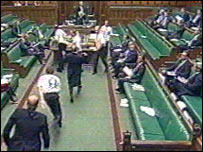Inquiry to look at MPs' role in declaring war

Matthew Tempest and agencies
Thursday August 11, 2005
Senior peers are to reopen the controversial issue of the government's power to declare war without consulting the House of Commons.
Ahead of the 2003 invasion of Iraq there was an unprecedented full vote of the house to approve military action. The vote was, however, purely symbolic and was not binding on the government.
Under the royal prerogative powers, a government can declare war and deploy armed forces without the backing or consent of parliament.
Now the House of Lords select committee on the constitution is to investigate whether MPs should be given an official say ahead of military action.
The chairman of the all-party committee, Lord Holme, said: "This has been one of the most important constitutional issues of the past few years, on which feelings run understandably high.
"It is important to conduct a thorough inquiry to identify how the requirements of democracy and national emergency can best be reconciled."
Under pressure, the government did allow parliament a vote before the Iraq war in March 2003, which it won despite a Labour rebellion and the opposition of the Liberal Democrats, thanks to nearly unanimous backing from the Conservatives.
The vote led to calls that it the government should be obliged to seek parliament's approval before taking action in future conflicts.
In 2004, the House of Commons public administration committee published a report on ministers' prerogative powers recommending that "any decision to engage in armed conflict should be approved by parliament, if not before military action then as soon as possible afterwards".
But the government responded that they were "not persuaded" that replacing prerogative powers within a statutory framework would improve the present position.
Since then, three private members' bills have been brought forward seeking to give parliament a greater role in the exercise of these royal prerogative powers.
The Lords committee will be asking what alternatives there are to the use of royal prerogative powers in the deployment of the armed forces, and will want to know if models drawn from the practice of other democratic states provide useful comparisons.
The inquiry was welcomed by the constitutional campaign group Charter 88.
Co-director Ron Bailey said "Going to war is one of the most important decisions a country can take, but our democratically elected parliament has no formal right to debate the issue, as the prime minister uses the royal prerogative to make the decision.
"The antiquated royal prerogative is more in tune with the 15th than 21st century. There is massive support both within parliament and the public for change.
"President George Bush must ask Congress before being able to deploy US troops abroad, while there is no requirement for the British parliament to even debate the issue."
In an interview with the Daily Telegraph earlier this year, the chancellor, Gordon Brown, appeared to give the idea his backing.
He told the paper: " Now that there has been a vote on these issues so clearly and in such controversial circumstances, I think it is unlikely that except in the most exceptional circumstances a government would choose not to have a vote in parliament."
Link Here




0 Comments:
Post a Comment
<< Home